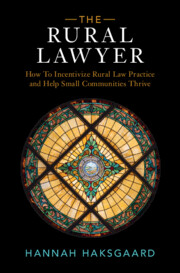12167 results in Socio-Legal Studies
4 - Choosing Rural Practice
-
- Book:
- The Rural Lawyer
- Published online:
- 06 March 2025
- Print publication:
- 13 March 2025, pp 42-62
-
- Chapter
- Export citation
Appendix: Participating Attorneys
-
- Book:
- The Rural Lawyer
- Published online:
- 06 March 2025
- Print publication:
- 13 March 2025, pp 175-182
-
- Chapter
- Export citation
Figures
-
- Book:
- The Rural Lawyer
- Published online:
- 06 March 2025
- Print publication:
- 13 March 2025, pp vii-viii
-
- Chapter
- Export citation
10 - Community Impact
-
- Book:
- The Rural Lawyer
- Published online:
- 06 March 2025
- Print publication:
- 13 March 2025, pp 142-153
-
- Chapter
- Export citation
7 - Legal Work
-
- Book:
- The Rural Lawyer
- Published online:
- 06 March 2025
- Print publication:
- 13 March 2025, pp 90-108
-
- Chapter
- Export citation
1 - Introduction
-
- Book:
- The Rural Lawyer
- Published online:
- 06 March 2025
- Print publication:
- 13 March 2025, pp 1-11
-
- Chapter
- Export citation
8 - Mentorship
-
- Book:
- The Rural Lawyer
- Published online:
- 06 March 2025
- Print publication:
- 13 March 2025, pp 109-124
-
- Chapter
- Export citation
3 - Policy Responses
-
- Book:
- The Rural Lawyer
- Published online:
- 06 March 2025
- Print publication:
- 13 March 2025, pp 28-41
-
- Chapter
- Export citation
Tables
-
- Book:
- The Rural Lawyer
- Published online:
- 06 March 2025
- Print publication:
- 13 March 2025, pp xi-xii
-
- Chapter
- Export citation
Acknowledgments
-
- Book:
- The Rural Lawyer
- Published online:
- 06 March 2025
- Print publication:
- 13 March 2025, pp xiii-xiv
-
- Chapter
- Export citation
Index
-
- Book:
- The Rural Lawyer
- Published online:
- 06 March 2025
- Print publication:
- 13 March 2025, pp 183-189
-
- Chapter
- Export citation
12 - Conclusion
-
- Book:
- The Rural Lawyer
- Published online:
- 06 March 2025
- Print publication:
- 13 March 2025, pp 166-173
-
- Chapter
- Export citation

The Rural Lawyer
- How To Incentivize Rural Law Practice and Help Small Communities Thrive
-
- Published online:
- 06 March 2025
- Print publication:
- 13 March 2025

Immoral Traffic
- An Ethnography of Law, NGOs, and the Governance of Prostitution in India
-
- Published online:
- 06 March 2025
- Print publication:
- 24 April 2025
Case Study 1.1 - Alibaba and Ant Group
- from Section 1 - Corporations
-
-
- Book:
- A Casebook on Chinese Outbound Investment
- Published online:
- 28 February 2025
- Print publication:
- 06 March 2025, pp 27-47
-
- Chapter
-
- You have access
- Open access
- HTML
- Export citation
Case Study 1.2 - Chinese M&A in Latin America
- from Section 1 - Corporations
-
-
- Book:
- A Casebook on Chinese Outbound Investment
- Published online:
- 28 February 2025
- Print publication:
- 06 March 2025, pp 48-64
-
- Chapter
-
- You have access
- Open access
- HTML
- Export citation
Contents
-
- Book:
- A Casebook on Chinese Outbound Investment
- Published online:
- 28 February 2025
- Print publication:
- 06 March 2025, pp v-vii
-
- Chapter
-
- You have access
- Open access
- HTML
- Export citation
Contributors
-
- Book:
- A Casebook on Chinese Outbound Investment
- Published online:
- 28 February 2025
- Print publication:
- 06 March 2025, pp xi-xiii
-
- Chapter
-
- You have access
- Open access
- HTML
- Export citation
Case Study 3.3 - The Special Economic Zone at Duqm, Oman
- from Section 3 - Infrastructure
-
-
- Book:
- A Casebook on Chinese Outbound Investment
- Published online:
- 28 February 2025
- Print publication:
- 06 March 2025, pp 172-194
-
- Chapter
-
- You have access
- Open access
- HTML
- Export citation
Section 2 - Compliance
-
- Book:
- A Casebook on Chinese Outbound Investment
- Published online:
- 28 February 2025
- Print publication:
- 06 March 2025, pp 65-130
-
- Chapter
-
- You have access
- Open access
- HTML
- Export citation


